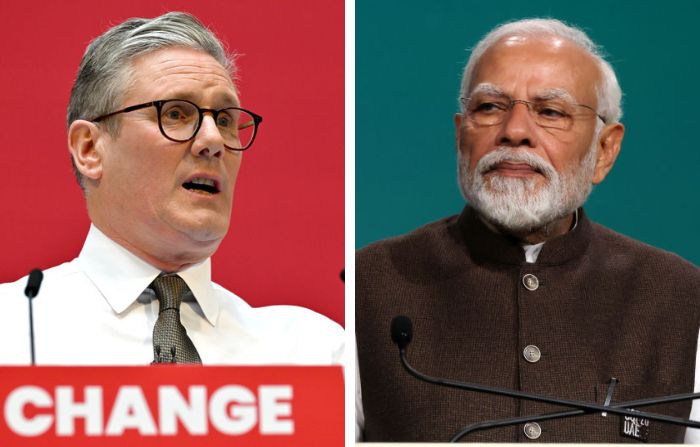- Monday, April 21, 2025
The slogan ‘acche din aane wala hain’ (good days are coming) was made popular by India’s ruling Hindu nationalist Bharatiya Janata Party ahead of the country’s 2014 election that it won and Modi became the PM.

By: Shubham Ghosh
JULY 4, 2024, for the UK could be what May 16, 2014, was for India. It was on the day in May a decade ago that incumbent prime minister Narendra Modi’s Bharatiya Janata Party (BJP) had toppled the government of Manmohan Singh, which was in a shambles at that moment. As the supporters of the Hindu nationalist party and its leader had preached then: “Acche din aane wala hain” (happy days are coming).
Whether the happy days really arrived or not will be up for analysis, there was no doubt that after a decade-long rule of the Indian National Congress-led alliance, the Modi wave had brought a fresh air of change, particularly after the second phase of the Singh government had inspired few with its blighted run. This year, the Indian prime minister returned to power for the third successive time, although with a reduced majority. But still he is by far the most popular leader in the country.
In the UK, the Labour led by Keir Starmer might not have generated the same kind of wave as Modi did in India 10 years ago. In fact, contrary to Modi and BJP, the Labour has repeatedly said that it doesn’t have a “magic wand” to change the UK’s situation overnight.
Read: Eastern Eye debate: Labour will focus on legal migration, says Anneliese Dodds
The current opposition party is also waiting to return to power after a long gap — after 14 years to be precise — and is expected to fix a lot of problems after the Tories’ chaotic rule in this period, which saw as many as five premiers and something unsettling like Brexit.
It is to be seen how the Labour addresses the UK’s own problems if it wins the election but when it comes to India, things could take a turn for the better.
Read: British Indian body wants new UK government to reshape India ties
Noted Indian foreign policy analyst and journalist C Raja Mohan has written in a column in The Indian Express that New Delhi “is well-placed to advance the bilateral relationship under a new Labour government” led by Starmer.
He said while the Tories “presided over a positive orientation of ties between London and Delhi”, the Labour’s return to power might make the Indian side anxious about the bilateral ties, keeping in mind the low they witnessed in the late 1990s. Former Indian prime minister Inder Kumar Gujral had even dismissed former British foreign secretary Robin Cook’s offer to mediate on the Kashmir problem between India and Pakistan, calling Britain a “third-rate power”.
“Britain is a third-rate power nursing illusions of grandeur of its colonial past. It created Kashmir when it divided India. Now it wants to give us a solution,” the former prime minister had said in Cairo in Egypt, hours before the late Queen Elizabeth kicked off her state visit to India to mark the country’s 50 years of independence from British rule.
David Cameron, who was the prime minister when the Tories returned to power in 2010, had made an early visit to India and every minister that had accompanied him on the trip was told not to mention Kashmir. It still took a long time before India and the UK genuinely found themselves settling over a vision for future partnership, shedding the baggage of history.
Now chances of Labour returning to power, could the Cook days be back again?
It is unlikely that would happen. Under Starmer, the Labour Party has seen a sea change as he has doused the anti-India flames that were lit during the days of his predecessor Jeremy Corbyn. The party’s move to include references to Kashmir in its manifesto for the 2019 elections annoyed India and mobilised the Hindu community in favour of the Conservatives.
Starmer has taken a completely opposite stance. He has reached out to the Hindu communities in the UK and the Indian diaspora and is in no mood to accept radical ideologies.
He is more interested to build on the foundation prepared by the same forces he is trying to defeat in this election — the Tories. With Tories led by a Hindu prime minister who is also wooing the community whole-heartedly, Starmer is putting even more efforts to win the hearts. Recently, he was at the Swaminarayan temple in Kingsbury where he spoken against Hinduphobia and vowed to shield the interests of the British Hindus.
Apart from the ethnic identity part, India and the UK also have much to gain in other fields such as economy and technology. India today might be a bigger economy than Britain, but it still trails the latter by far in terms of per capita income. The south Asian nation’s exports to Britain today are sizeable and the European nation, although is not the same league as the US or China, it still has a significance as a financial and technological powercentre.
India can reset its ties with the UK instead of overhauling from the days of the Tories, particularly in the case of the free trade deal. The turmoil in times of the Tories pegged the progress on the free-trade agreement (FTA) back, which made the Labour criticise the former for promising a lot but delivering a little. The Starmer-led government is expected to give a fresh boost to the FTA with India, reaching newer heights in various sectors such as technology and defence and economy as a whole.
Far from the days of Cook and Corbyn, the new Labour under Starmer would certainly deal with India with a completely fresh approach based on reality if in power and in that way, the bilateral ties are likely to see “acche din”.